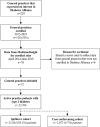Spillover effects from a type 2 diabetes integrated model of care in 22,706 Australians: an open cohort stepped wedge trial
- PMID: 39256722
- PMCID: PMC11384678
- DOI: 10.1186/s12902-024-01692-4
Spillover effects from a type 2 diabetes integrated model of care in 22,706 Australians: an open cohort stepped wedge trial
Abstract
Background: Many Australian adults are not receiving timely or effective diabetes management to prevent or delay the onset of diabetes related complications. Integrated care, a worldwide trend in healthcare reform, aims to reduce the fragmented delivery of health services and improve outcomes. This study aimed to test whether a specialist-led integrated model of care provided to a small subset of patients in general practices leads to spillover clinical improvements in all patients of the practice with type 2 diabetes.
Methods: Seventy-two general practice sites (clusters) in New South Wales, Australia received the Diabetes Alliance intervention, creating a non-randomised open cohort stepped wedge trial. The intervention comprised of case conferencing, delivered directly to a small proportion of adults with type 2 diabetes (n = 1,072) of the general practice sites; as well as practice feedback, education and training. Spillover clinical improvements were assessed on all adults with type 2 diabetes within the general practice sites (n = 22,706), using practice level data recorded in the MedicineInsight electronic database, compared before and after the intervention. Outcome measures included frequency of diabetes screening tests in line with the Annual Cycle of Care, and clinical results for weight, blood pressure, HbA1c, lipids, and kidney function.
Results: Compared to before Diabetes Alliance, the odds of all practice patients receiving screening tests at or above the recommended intervals were significantly higher for all recommended tests after Diabetes Alliance (odds ratio range 1.41-4.45, p < 0.0001). Significant improvements in clinical outcomes were observed for weight (absolute mean difference: -1.38 kg), blood pressure (systolic - 1.12 mmHg, diastolic - 1.18 mmHg), HbA1c (-0.03% at the mean), total cholesterol (-0.11 mmol/L), and triglycerides (-0.02 mmol/L) (p < 0.05). There were small but significant declines in kidney function.
Conclusions: Integrated care delivered to a small subset of patients with type 2 diabetes across a large geographic region has spillover benefits that improve the process measures and clinical outcomes for all practice patients with type 2 diabetes.
Trial registration: ACTRN12622001438741; 10th November 2022, retrospectively registered: https://www.anzctr.org.au/ACTRN12622001438741.aspx .
Keywords: Outcome assessment; Clinical trial; Diabetes mellitus; General practice; Health services; Type 2.
© 2024. The Author(s).
Conflict of interest statement
The authors declare no competing interests.
Figures


Similar articles
-
Use of professional-mode flash glucose monitoring, at 3-month intervals, in adults with type 2 diabetes in general practice (GP-OSMOTIC): a pragmatic, open-label, 12-month, randomised controlled trial.Lancet Diabetes Endocrinol. 2020 Jan;8(1):17-26. doi: 10.1016/S2213-8587(19)30385-7. Lancet Diabetes Endocrinol. 2020. PMID: 31862147 Clinical Trial.
-
Variation in the use of primary care services for diabetes management according to country of birth and geography among older Australians.Prim Care Diabetes. 2016 Feb;10(1):66-74. doi: 10.1016/j.pcd.2015.07.001. Epub 2015 Aug 1. Prim Care Diabetes. 2016. PMID: 26243389
-
Model of care for the management of complex Type 2 diabetes managed in the community by primary care physicians with specialist support: an open controlled trial.Diabet Med. 2013 Sep;30(9):1112-21. doi: 10.1111/dme.12251. Epub 2013 Jun 28. Diabet Med. 2013. PMID: 23758279 Clinical Trial.
-
Impact of a social prescribing intervention in North East England on adults with type 2 diabetes: the SPRING_NE multimethod study.Public Health Res (Southampt). 2023 Mar;11(2):1-185. doi: 10.3310/AQXC8219. Public Health Res (Southampt). 2023. PMID: 37254700
-
Psychological interventions to improve self-management of type 1 and type 2 diabetes: a systematic review.Health Technol Assess. 2020 Jun;24(28):1-232. doi: 10.3310/hta24280. Health Technol Assess. 2020. PMID: 32568666 Free PMC article.
References
-
- Saeedi P, Petersohn I, Salpea P, Malanda B, Karuranga S, Unwin N, et al. Global and regional diabetes prevalence estimates for 2019 and projections for 2030 and 2045: results from the International Diabetes Federation Diabetes Atlas, 9(th) edition. Diabetes Res Clin Pract. 2019;157:107843. 10.1016/j.diabres.2019.107843 - DOI - PubMed
-
- Australian Institute of Health and Welfare (AIHW). Australian Burden of Disease Study: impact and causes of illness and death in Australia 2015—Summary report. Canberra, ACT 2019.
-
- Australian Institute of Health and Welfare (AIHW). Prevalence of self-reported type 2 diabetes, among persons aged 18 and over, 2017–18. Canberra, ACT AIHW; 2020.
-
- Baker IDI, Heart and Diabetes Institute. Diabetes: the silent pandemic and its impact on Australia. 2012.
MeSH terms
Supplementary concepts
LinkOut - more resources
Full Text Sources
Medical

